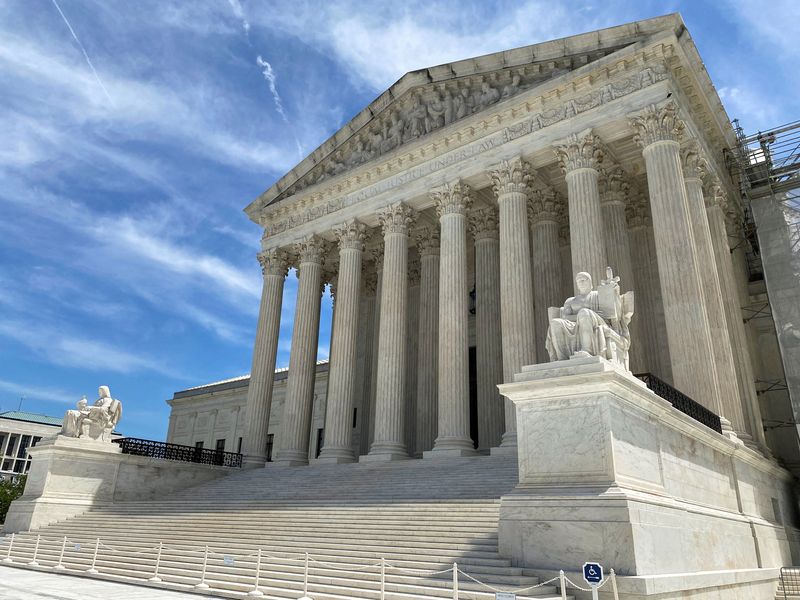By Andrew Chung and John Kruzel
WASHINGTON (Reuters) -The U.S. Supreme Court heard arguments on Wednesday over a challenge on free speech grounds to a Texas law that requires pornographic websites to verify the age of users in a case testing the legality of state efforts to keep minors from viewing such material online.
A trade group representing adult entertainment performers and companies appealed a lower court's decision allowing the Republican-led state's age-verification mandate, finding that it likely did not violate the U.S. Constitution's First Amendment safeguard against government abridgment of speech.
The arguments were ongoing.
The challengers, represented by the American Civil Liberties Union and others, include the Free Speech Coalition, a trade association of adult content performers, producers and distributors, as well as companies that run several pornographic websites including Pornhub.com and xnxx.com.
Derek Shaffer, a lawyer for the Free Speech Coalition, told the justices that the Texas law burdens constitutionally protected speech based on its content, specifically by imposing an age-verification barrier before anyone can access a sexually themed website. Shaffer urged the Supreme Court to restore a federal judge's injunction that had put the law on hold.
Allowing the Texas law to take effect using the form of judicial review employed by the lower court in this case "could open the door to an emerging wave of regulations that could imperil free speech online," Shaffer said.
The 2023 measure is one of 19 similar ones enacted around the United States, primarily in Republican-governed states, as policymakers worry about how the proliferation of hardcore pornographic material online affects the wellbeing of minors.
The Texas law requires any website whose content is more than a third "sexual material harmful to minors" to require all users to submit personally identifying information verifying that they are at least 18 years old to gain access.
Conservative Justice Clarence Thomas asked Shaffer whether any age-verification system could be permissible under the Constitution.
"I don't think the court needs to close the door to that here but it would need to be tailored age verification," Shaffer said.
Specifically, Shaffer said the age-verification system should make sure that the confidentiality of the user is legally assured. The challengers have argued that online age verification unlawfully stifles the free speech rights of adults and exposes them to increasing risks of identity theft, extortion and data breaches.
"Do you dispute the problem that Texas is targeting of children's access to pornography?" conservative Justice Brett Kavanaugh asked Shaffer.
"We don't dispute the underlying problem. We support efforts to solve the problem as long as they are properly tailored," Shaffer responded.
"Do you dispute the societal problems that are created both short-term and long-term from the rampant access to pornography for children?" Kavanaugh then asked Shaffer.
"I would say this: I think there is a discussion - a robust discussion and a healthy discussion - about whether all sorts of things involving screens and the internet and social media and interactions over the internet, whether those are unhealthy for children," Shaffer said.
CONTENT-FILTERING
The challengers also have said content-filtering software and on-device age verification would work better to protect minors than laws like the one at issue. But some of the conservative justices questioned the effectiveness of content-filtering.
"Kids can get online porn through gaming systems, tablets, phones, computers," Justice Amy Coney Barrett told Shaffer. "Let me just say that content-filtering for all those different devices, I can say from personal experience is difficult to keep up with. And I think that the explosion of addiction to online porn has shown that content-filtering isn't working."
Shaffer said that content-filtering "is now technologically better than ever, more readily available than ever."
Texas, Shaffer told the justices, is pursuing "a broader anti-porn interest in preventing willing adults from accessing this content. They want to make it more difficult. They want to make it costlier. They want to make it chilling."
Barrett told Shaffer that "there's a sense here that the state should be able to protect minors from some of this."
The case tests the limits of state powers to protect minors from explicit materials deemed by policymakers to be harmful to them with measures that burden the access of adults to constitutionally protected expression.
The Supreme Court last year denied a request by the challengers to halt enforcement of the law while litigation in the dispute proceeded.
Some sites like Pornhub have responded by blocking access entirely in states with age-verification laws.
The challengers noted that Supreme Court precedents have long protected access by adults to non-obscene sexual content, including a 2004 ruling that blocked a federal law similar to the Texas measure. If the 2004 precedent prevents Texas from enforcing its law, then it should be overruled, the state argued.
Kavanaugh asked Shaffer about changes in technology since that 2004 ruling.
Texas told the Supreme Court that through smartphones and other devices, children have easy access to an "avalanche of misogynistic and often violent smut" including "graphic depictions of rape, strangulation, bestiality and necrophilia." Much of the content on pornographic websites "is obscene even for adults."
U.S. District Judge David Alan Ezra issued a preliminary injunction in 2023, blocking the law.
The New Orleans-based 5th U.S. Circuit Court of Appeals ruled in 2024 that the plaintiffs were unlikely to succeed in their First Amendment challenge to the age-verification requirement, lifting Ezra's injunction on that provision.
The 5th Circuit upheld Ezra's injunction against a separate provision of the law requiring websites to display "health warnings" about the effects of viewing pornography.

President Joe Biden's administration urged the Supreme Court to throw out the 5th Circuit decision and order it to reconsider the case under a more stringent form of judicial review.
A Supreme Court ruling is expected by the end of June.